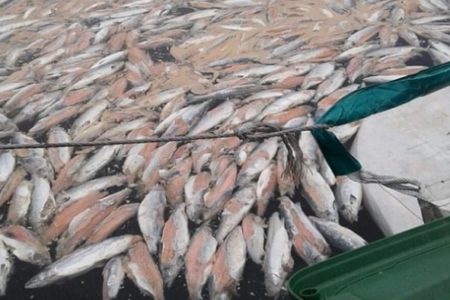Patagonian Far West: Aqua Chile salmon company agrees collaboration with four Kawesqar communities
– The hidden reason for the salmon company in this express agreement in Patagonia is to obtain «social licenses» to certify it´s salmon in the international market
– The most peculiar aspect of this deal says that the Kawésqar communities «will have access under preferential conditions to AquaChile products,» while its entrepreneurial members «will be able to access salmon as raw material under preferential conditions.»
– Faced with this, Ecoceanos pointed out that AquaChile is «repeating the same plundering role that in the 19th century and the beginning of the 20th century the cattle ranchers, fur hunters and gold seekers played bloody in the appropriation of the territories and resources of Patagonia» .
Puerto Natales, Magallanes, March 28, 2021. (radiodelmar.cl) – The mega salmon company Aqua Chile, owned by businessman Gonzalo Vial, signed an express agreement with four Kawesqar communities in the Magallanes region. The unilateral agreement called «Compromiso Magallanes», (Magellan Compromise) has the objective -according to the statement of the salmon producer and exporter-, «to enhance the continuous linkage of the company with the regional territory.»
In the city of Puerto Natales, Sady Delgado, general manager of AquaChile, and Álvaro Gallardo, representative of the Chamber of Tourism of Última Esperanza, agreed to an assistance agreement with Juan Carlos Tonko and Gabriela Tonko from the Kawésqar Community Residents of Puerto Edén; Lucía Uribe Caro and Luisa Caro Pérez, representatives of the K’skial Community; and María Francisca Dubó, representative of the Kawésqar Residents Community of Puerto Natales; and Amil Caro and Cinthya Montiel, from the Kawesqar C´ac´ap Juana Pérez Community
Cultural assimilation 3.0: The terms of the agreement drawn up by Aqua Chile
The mega company AquaChile is the number one producer of farmed salmon in Chile, and the second in the world, being controlled from Santiago de Chile by the Agrosuper holding company.
The statement affirms that the priority areas identified by the salmon company are to «promote the ecosystem approach for the salmon farming industry in Magallanes», for which they will establish an «open door policy in their farming centers, fish farms and processing plants to the scientific community to investigate the impacts of the company operations, and promote the best aquaculture practices ”. They also commit to «implement a sustainable production model that is compatible, and that contributes to the tourist vocation, and to the conservation of the territory in which AquaChile operates.» (sic)
Salmon offerings in pandemic times
Taking advantage of the fact that the country is in the middle of electoral campaigns, the company Aqua Chile committed itself in the agreement to generate “at least 600 direct quality jobs”, where “over 95% of the workers will have residence in the region».
The company also promised the «creation of 200 indirect jobs in service companies and suppliers with preference for inhabitants of the region», and said that it will privilege the hiring of services and purchases from local suppliers of Magallanes.
Kawésqar communities will be able to access AquaChile products at preferential prices
Placing itself “in tune” with current times, Aqua Chile also committed to “promote spaces for participation and dialogue”, with the aim of “jointly defining (sic) social investment in the territory where the company operates”. This proposal was reminiscent of the feudal behavior of the old sheep farmers of Chilean Patagonia.
The most striking thing about the agreement is that AquaChile will sell salmon to the signatory Kawesqar communities at cheaper prices. The agreement says that the Kawésqar communities of Magallanes «will have access under preferential conditions to AquaChile products,» while its entrepreneurial members «will be able to access salmon as raw material under preferential conditions.»
And giving the final touch to the «Magallanes Commitment», Aqua Chile will support «the rescue, and due appreciation of the ancestral Kawésqar culture», as well as the «delivery of scholarships for academic excellence for children», and «scholarships for training for careers related to the sea, aquaculture and Kawésqar culture (?) ”.
The hidden reason for the agreement: Obtaining «social licenses» to certify salmon in the international market
Since 2019, the large salmon producing and exporting companies began their “strategy of good neighborliness and relationship with local communities” as part of the so-called “Social Initiative for Salmon (ISS)”. This political-business proposal was born after in 2017 the transnational organization WWF, together with the Norwegian bank Rabobank and the Consensus Building Institute (CBI), produced the manual “Guidance and tool box for salmon companies in their responsible relationship with communities”.
Large salmon companies such as Aqua Chile immediately began to implement this adaptive strategy, as they had to obtain the so-called “social licenses” from local communities, which were required by the Aquaculture Stewardship Council (ASC) certifier, linked to the WWF, to deliver environmental and social seal to its export products to the competitive North American market, the main destination for salmon produced in Chile.
This is how companies such as AquaChile, Australis Seafoods, Blumar Seafoods, Caleta Bay, Cargill, Cermaq Chile, Mowi Chile, Multiexport Foods, Salmones Camanchaca and Salmones Austral under the so-called “Salmon Social Initiative”, in May 2019 signed in the city of Puerto Montt, the ten Commitments for a Responsible Relationship with Communities.
The main objective of Aqua Chile’s strategy is to achieve ASC certification in 100% of its salmon farming centers in the Patagonian regions.
The other cause: judicial defeat that annulled the environmental permit for mega salmon pisciculture in Patagonia
For sectors linked to the regional salmon farming activity, the agreement imposed by Aquachile in the territories of the Kawesqar People is a media response to the recent victory of the communities that faced the abusive actions of the Sealand Aquaculture Company in the environmental and justice courts.
After a prolonged legal fight, the Third Chamber of the Supreme Court, annulled the environmental permit that, with much social questioning, the company Sealand Aquaculture obtained to impose a salmon fish farm in Lake Balmaceda, one of the largest salmon farms in the world.
The main Chilean court unanimously accepted the appeal that the Aswaal Lajep Kawesqar community had presented through the counselor Marcela Caro Loncuante, annulling the previous ruling of the Valdivia Environmental Court, which had rejected the claim of the Kawesqar community against the director Executive of the Environmental Assessment Service (SEA), which had approved the Environmental Qualification Resolution (RCA) of the project «Recirculation fish farming Lago Balmaceda», located near Puerto Natales.The historic Supreme Court judgment established the existence of an error in law by the SEA, which had approved it in an area of influence that included protected lands of the Kawésqar community.
With this, Exempt Resolution No. 681 of May 31, 2019 was annulled, with the favorable votes of the Ministers Sergio Muñoz, María Eugenia Sandoval, Ángela Vivanco, and the member attorneys Jorge Lagos and Julio Pallavicini.
Patagonia: The Kawésqar fight continues to defend ancestral rights against the salmon invasion
Faced with the impressive advance of the salmon industry in indigenous territories of Patagonia, Leticia Caro, spokesperson for the Kawesqar Communities for the Defense of the Sea, said that “we think it is necessary to advance towards the substantive rights of the peoples, since it is precarious to have to be demonstrating in each salmon project, the rights that assist us, omitting what is elementary ”.
«This only shows that the institution does not know the ancestral boundaries, or only seeks to arbitrarily deprive us of our elementary rights, enshrined in international treaties on access and use of the sea signed by Chile,» she said. The Kawésqar Communities for the Defense of the Sea assured that they will continue to “fight against the expansion of the salmon industry, since we have no intention of promoting or favoring its installation, nor of granting them rights over our territories, since these ancestral rights were bequeathed by our ancients for the well-being of their legitimate heirs. »
Ecoceanos: The salmon industry is the continuation of the processes of cultural assimilation and territorial dispossession in Chilean Patagonia
For the citizen organization Ecoceanos Centre «this colonialist, welfare and clientelist nature salmon agreement, constitutes a new warning signal for social organizations about the role of social, economic and cultural assimilation played by the salmon-producing and exporting industry owned by family clans such as Gonzalo Vial, and also norwegian, japanese, canadian and chinese transnationals companies ”.
The salmon company AquaChile is «repeating the same plundering role that in the 19th century and the beginning of the 20th century the cattle ranchers, fur hunters and gold prospectors played bloodily in the appropriation of the Patagonian «, the citizen organization affirmed.
***END***





